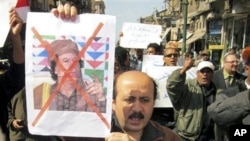An official of the U.S.-based Human Rights Watch (HRW) said her organization is increasingly concerned and seriously alarmed about what she described as the ongoing murder of unarmed protesters who are demanding reforms in Libya.
Heba Fatma Morayef, researcher for the Rights Organization for Egypt and Libya, told VOA it appears is behind the shootings deaths of the unarmed protesters since the Tunisian and Egyptian-inspired protests in the North African country.
“The overall death toll now is at 223 and that is just in the previous days. Regardless of who is doing the shooting, in this case, whether its mercenaries, whether its plainclothes individuals with weapons, the responsibility remains (for) the state to protect the demonstrators,” said Morayef.
“And, in this case, the violence seems to be overwhelmingly at the hands of state agents. And so, what we are looking at right now is something that could turn into a massacre very soon.”
Analysts say the protests represent an unprecedented challenge to the four-decade rule of long-time Libyan leader Moammar Gadhafi, whose supporters have also staged small rallies in the capital, Tripoli, in recent days.
Morayef said there are indications that state agents are behind the shooting of the protesters. She also said the Libyan authorities have made it difficult for human rights organizations to do their work.
“We have (had) complicated relations with the Libyan government in the past. We’ve been relying in the past few days on making our requests through media pressure and we’ve also been trying to reach any authorities outside the country and also to get governments such as the United States and the European Union governments to stake a strong stance on this and to pressure Libyan officials into stopping the killings,” said Morayef.
“Based on the numerous interviews we’ve conducted with eyewitnesses, with medical staff over the phone, is that there is a clear exerted use of force that is occurring more generally. So, we can see that there is a violation…Overall, the Libyan government has done everything it can to provide (an) information blackout to allow them to control things however they want without the feeling of international pressure on them.”
Hospital officials in Libya’s second-largest city, Benghazi, said the crackdown there alone has killed at least 200 people and wounded hundreds of others.
U.S. State Department spokesman P.J. Crowley said the United States is “gravely concerned” by what he called “multiple credible reports” of hundreds killed or injured in protest-related violence.
The demonstrations have been largely confined to Benghazi and other cities in eastern Libya since they began last Tuesday. They represent an unprecedented challenge to the four-decade rule of Libyan leader Moammar Gadhafi, whose supporters have staged small rallies in the capital, Tripoli, in recent days.
Mr. Gadhafi has promised dialogue on the Libyan constitution and a return to “local government,” imploring his countrymen not to “divide the country.”




